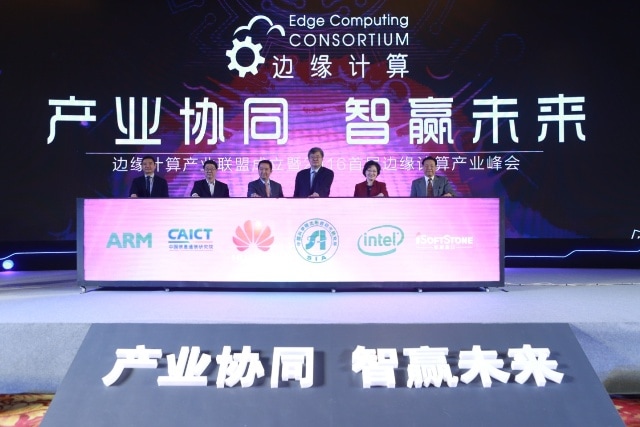Edge Computing Consortium is Established to Deepen Digital Transformation
[Beijing, China, November 30th, 2016] Today, the Edge Computing Consortium (ECC) was officially established in Beijing, China. This initiative was jointly created by Huawei Technologies Co., Ltd., Shenyang Institute of Automation of Chinese Academy of Sciences, China Academy of Information and Communications Technology (CAICT), Intel Corporation, ARM, and iSoftStone.
The ECC aims to build a cooperative platform for the edge computing industry that will give impetus to openness and collaboration in the Operational Technology (OT) and Information and Communications Technology (ICT) industries, nurtures industrial best practices, and stimulates the healthy and sustainable development of edge computing.

The Edge Computing Consortium is Officially Established
Today's global digital revolution is driving a new round of industrial restructuring. Through the digital transformation of industries, products are incorporated into intelligent interconnection. In-depth coordination and convergence of OT and ICT help improve industrial automation, meet the customized requirements of products and services, promote full-lifecycle transformation from products to service operations, and trigger the innovation of products, services, and business models. This will have a lasting impact on the value chain, supply chain, and ecosystem.
Yu Haibin, Chairman of the ECC and Director of Shenyang Institute of Automation, the Chinese Academy of Sciences, said, "In the 13th Five Year Plan, China launched two national strategies, integration of digitization and industrialization, as well as ‘Made in China 2025’. This requires much on ICT and OT convergence. Edge Computing is key to supporting and enabling this convergence. Meanwhile, industrial development is also facing a turning point.
“Industrial automation technology systems will evolve from layered architecture and information silos to IoT, cloud computing, and Big Data analytics architecture. Amidst the evolution, edge computing will bolster distributed industrial automatic self-control architecture. Therefore, the ECC will keep eyes on the design of the architecture and the choice of technical roadmap, as well as promoting industrial development through standardization. In addition, building an ecosystem will also be focused," continued Yu Haibin.
The ECC is in pursuit of the OICT concept that OT, information technology (IT), and communications technology (CT) resources should integrate and coordinate with each other, and stick to the spirit of consensus, unity, and win-win cooperation, to drive forward the ECC's healthy development. The ECC strives to advance cooperation among industry resources from government, vendors, academics, research, and customer sectors.
The Edge Computing Consortium’s White Paper was also released at the 2016 Edge Computing Industrial Summit, during the ECC's launch ceremony. It puts emphasis on the edge computing industry's trends and major challenges, elaborates on the definition and content of edge computing, displays the ECC's top-level design and operational model, and formulates the reference architecture and technological framework of edge computing, guiding the ECC's future development.

